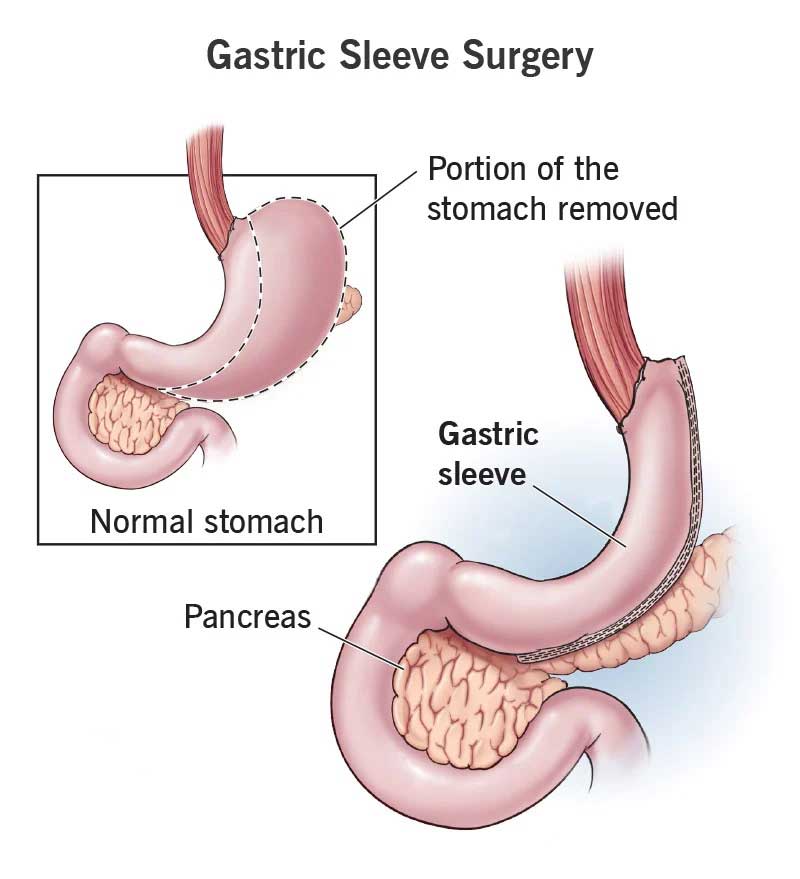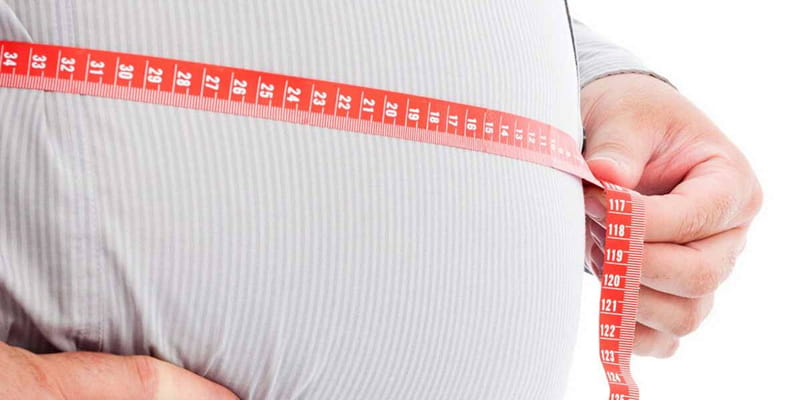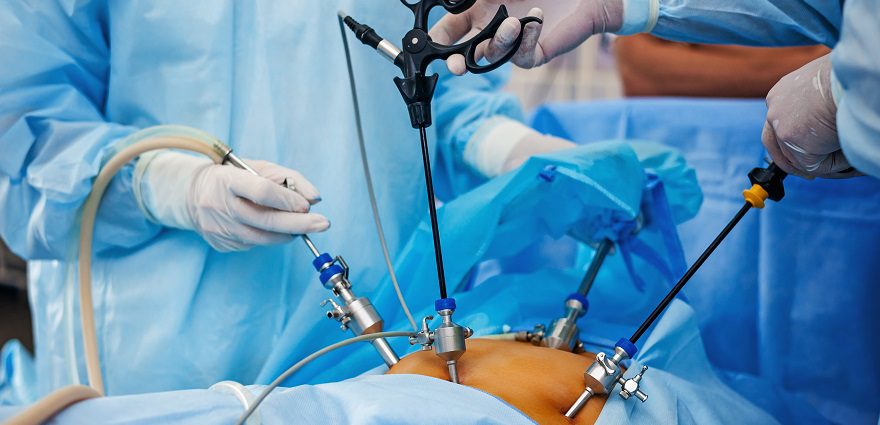Sleeve Gastrectomy is a surgical procedure that causes weight loss by restricting food intake.
This bariatric surgery is usually performed using a laparoscopic, minimally invasive technique. During the operation, the surgeon removes 75 percent of the stomach. This causes the stomach to take on the shape of a tube or “sleeve” that contains much less food.
Originally developed as the first stage of a two-stage procedure for obese or high-risk patients, Sleeve Gastrectomy is now widely used for weight loss in people with a BMI (Body Mass Index) over 40.
In a Sleeve Gastrectomy, no foreign body is implanted, as in the case of an adjustable gastric band, and there is no complex restructuring of the intestine, as in gastric bypass.

Most patients find that after a short recovery period, they can comfortably eat regular foods, including meats and fibrous vegetables. Unlike adjustable gastric banding and gastric bypass, Sleeve Gastroplasty is a completely irreversible procedure and cannot be reversed.
The effect of weight loss after this operation is due to two factors:
1.The smaller volume of the stomach ensures rapid satiety. Normally, the stomach of a healthy person has a volume of 1000 cm³. After the operation – approximately 150-200 cm³. As a result, saturation occurs when taking five to six times smaller portions.
2. Removing part of the stomach reduces the level of the hormone ghrelin in the blood, also called the “hunger hormone”. After surgery, many find they are much less hungry after Gastric Sleeve Surgery. Ghrelin also plays a role in blood sugar metabolism, which is why people with type II diabetes often see an immediate reduction in their need for diabetes medications (especially oral ones) after a Sleeve Gastrectomy.
When can be the operation applied?
Sleeve Gastrectomy has been used as the first stage of a two-stage procedure for patients at high risk and BMI > 60, but due to its simplicity and favorable results, it is now increasingly being offered as a separate primary procedure.In the first decade of the 21st century, several hundred Sleeve Gastrectomy procedures have been performed in Europe. Based on a follow-up period of 6 months to 3 years, patients were found to have lost 33-83% of their overweight. In the period from 2010 to the present day, the number of rescheduled operations in the European Union already amounts to several tens of thousands.
For many categories of patients of different ages, Sleeve Gastrectomy is recognized as preferable in comparison with gastric bypass.

This operation will be a good solution for active patients and those who travel frequently. This surgery usually results in rapid and predictable weight loss, which will be beneficial for those seeking weight loss in preparation for orthopedic procedures such as knee and hip replacements and spine surgery.
Sleeve Gastrectomy is also suitable for patients with Crohn’s disease or other bowel diseases, and for patients taking immunosuppressive drugs or planning an organ transplant.
In other patients, the decision to have a Sleeve Gastrectomy (instead of gastric bypass) is made during the operation. Reasons for making this decision during surgery include an overly large liver or extensive scar tissue that would make the gastric bypass procedure too long or unsafe.
Benefits of Sleeve Gastrectomy:
• Compared to other bariatric procedures, Sleeve Gastroplasty is a more physiological treatment. It is not accompanied by malabsorption, the formation of pathological and blind pathways, or the implantation of a foreign body. • Sleeve Gastrectomy causes rapid and profound weight loss comparable to gastric bypass surgery. Patients can expect to lose 50% or more of their excess weight within three years. • Hormonal changes due to the removal of a large surface of the stomach after the procedure help patients feel full, eat less, and also eliminate the symptoms of diabetes. • Sleeve Gastrectomy is safer than laparoscopic gastric bypass. The number of complications in the first 30 days with this procedure is lower. • This is a pharmacologically friendly operation. Aspirin and other NSAIDs are well tolerated when taken orally. You can also continue to use combined oral contraceptives.
Disadvantages of Sleeve Gastrectomy:
• As with other bariatric procedures associated with trauma to the stomach, the main disadvantage of gastrectomy is the severity of postoperative complications.
• Sleeve Gastrectomy is an irreversible procedure.
• Patients are at risk for long-term nutritional deficiencies. To a lesser extent than with gastric bypass, but more than with banding.
• In the long term (7 years or more), from a quarter to a third of all patients after a Sleeve Gastrectomy regain most of the weight lost, which may be a reason for a second operation.
Indications for the Operation
The indications for Sleeve Gastrectomy are basically the same as for other bariatric procedures. The classic criteria for identifying a patient as a candidate are:
• BMI ≥ 40 or BMI ≥ 35 with at least one concomitant obesity condition (cardiomyopathy, severe diabetes mellitus, etc.);
• Unsuccessful non-surgical weight loss attempts;• There are no medical contraindications for surgery;

Recent updates to the European Society for Endoscopic Surgery guidelines also include patients with a BMI of 30-35 with uncontrolled type 2 diabetes or metabolic syndrome as an indication for laparoscopic Sleeve Gastrectomy.
Revision surgery with Sleeve Gastrectomy may also be required to correct one or more of the complications of other bariatric surgeries:
• Ulcers or fistulas after gastric bypass;
• Persistent recurrent vomiting after bandage or vertical Sleeve Gastrectomy;
• Protein deficiency after gastric bypass;
• Reflux after vertical Sleeve Gastrectomy.
Contraindications:
Absolute contraindications include inability to tolerate general anesthesia, uncontrolled coagulopathy, and severe mental illness.
Relative contraindications are Barrett’s esophagus and severe gastroesophageal reflux disease.
In general, the number of contraindications for this operation is less than for gastric bypass surgery.
Benefits of Sleeve Gastrectomy with Astramedica:
1. Confidence in the result. Despite the fact that this is the “youngest” of the bariatric operations, Turkey has accumulated a lot of experience in its implementation. Every year, hundreds of patients from all other the world are operated on in Turkey.
2. This operation will be performed in a JCI-certified hospital, so you can benefit from a high level of comfort and advanced rehabilitation treatment programs as well as be sure that the latest technologies and equipment are used.
3. A complex approach. Nutritionists and physiotherapy specialists will work with the patient at the rehabilitation stage. They will provide detailed instructions on the correct way of life, which will contribute to a harmonious and lasting weight loss.
Preparation for the operation:
Before surgery, all patients should undergo endoscopy. Gastroscopy allows you to determine the condition of the gastric mucosa and how well the patient will tolerate major intervention.
There is ample evidence that the Optifast ultra-low calorie preoperative diet reduces liver size, leading to favorable outcomes. Reducing the size of the liver makes the operation less complicated, faster and reduces postoperative complications.
The patient is usually given preoperative antibiotics 30 minutes before the incision. Hair on the abdomen is removed with a hair clipper in the preoperative area. The patient is placed on the operating table and fixed in a supine position with outstretched arms. After anesthesia, an additional endoscope is inserted into the stomach.
Operation process:
Sleeve Gastrectomy is usually performed laparoscopically with several small incisions. Surgeons use narrow cylindrical tubes called trocars to access the abdominal cavity through small openings in the upper abdominal wall.
The duration of this procedure is from 30 to 60 minutes. After the procedure, the patient stays in the hospital for one or two nights. The initial recovery period takes three to four weeks.
Possible complications
There are risks associated with Sleeve Gastrectomy that are common to any laparoscopic procedure, such as:
• bleeding;
• infection;
• damage to other organs;
• the need to move to an open procedure.
There is also a small risk of perforation of the staple line used to separate the stomach. These problems are rare, and serious complications occur in less than 1% of cases.

The operative risks associated with LSH are slightly higher than those associated with laparoscopic gastric banding, but lower than those associated with gastric bypass.
Results of the operation:
As with Roux-en-Y gastric bypass, most of the weight loss is achieved in the first 2 years (>70% weight loss for BMI less than 50). After this, in some cases, there is a restoration of weight and expansion of the residual gastric sac.
Within 5 years, a steady weight loss in the region of 50% of excess was noted. Best results are achieved with good adherence to dietary and behavioral recommendations.
With a proper diet, regular exercise, and good eating habits, Sleeve Gastrectomy patients will feel good and maintain good weight loss.
A 2017 meta-analysis compared mid- and long-term outcomes for Sleeve Gastrectomy and gastric bypass. It was concluded that in the medium term (2-3 years after surgery) the two surgeries had the same results in terms of weight loss and resolution or improvement of comorbidities.
In the long term (5 years after surgery), patients after Sleeve Gastrectomy can partially restore body weight due to the light distension of the gastric sleeve.
Benefits of choosing AstraMedicaGroup
Only top qualified doctors
JCI certificated hospitals
Free COVID-19 Test before departure
4 nights in a 5-star hotel in Istanbul
Costs for laboratory, medication and equipment
Pre/post-operative tests
Free Istanbul tours
Latest technologies
Excelent travel assistance
All-round VIP transfer
Credit / Debit cards accepted
No prepayment
Personal assistants speak in English
24/7 customer service
